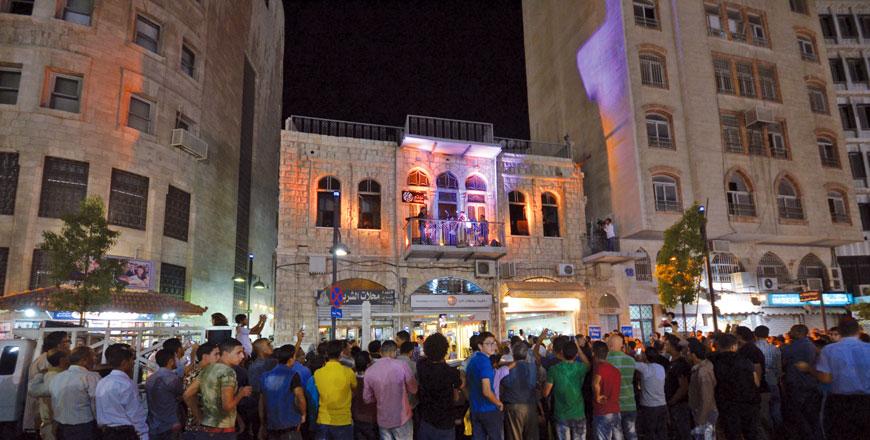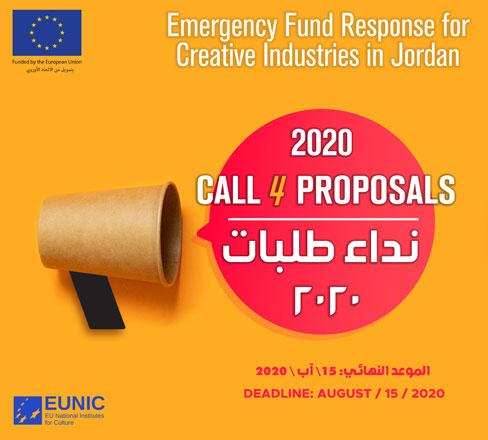You are here
'We need to support our cultural sector's competitiveness'
By Camille Dupire - Oct 13,2018 - Last updated at Oct 13,2018
AMMAN — A group of Jordanians concerned with the challenges and uncertainties faced by the cultural sector are joining forces to strengthen artists and cultural operators' competitiveness and capacities.
Launched in 2017, under the umbrella of the EU-funded "Tajalla" for Music and Art, the "Tashbeek" project aims to “build the capacities of cultural workers and create a sustainable and collaborative network of individuals, associations and spaces by organising artistic and cultural exchanges and dialogues,” according to Tajalla founder and managing director, Russol Al Nasser.
“Culture operators have great potential, but they lack basic skills on culture management. For instance, how to manage their culture project, be it poetry or music,” Nasser stated, stressing that “independent artists outside the capital face challenges in how to follow procedures. They have limited knowledge about laws, or how to register and set up the projects, let alone how to seek funding and build advocacy.”
Rich of her two decade long experience in the sector, Nasser conducted a mapping of the culture scene across the Kingdom, assessing its most pressing needs and partnering with various local groups such as Salt-based Ruwaq Al Ordon, Irbid's MedeArts and AtabetFann from Ramallah in the West Bank.
“The problems we faced were to find the right way to enhance awareness about the importance of people’s relations with their own culture and how to create the link with the general population’s lives. We wanted to deliver a message that culture is not only for entertainment, but a lifestyle and source of income,” the society's founder remembered, citing the deeply rooted scepticism she had to face among certain conservative communities.
Highlighting the conflict between the "undeniable talent of local artists" and their vulnerability to economic pitfalls and lack of opportunities to sustain their business, Nasser stressed the urgency of weaving a solid network of cultural operators and educating them on survival techniques.
With the support of the EU, Tashbeek brought together 50 artists and culture operators, training them on ways to strengthen their competitiveness and challenge the fragmentation of the local cultural sector.
For Belal Hiari, founder and manager of Rewaq Al Urdon, “working with Tashbeek presented a golden opportunity for us".
"Since our partnership, we have been able to invite artists from around the country, teach music to children and organise musical events to revive our local heritage,” he recounted, noting that hundreds of children are currently on the waiting list to take part in the organisation's upcoming music classes.
At the heart of Tashbeek's mission lies the support to marginalised societies, especially in places outside of the capital, such as Jerash, Madaba, Maan, Irbid or Salt.
“Culture is the perfect conduit to strengthen the society’s resilience during such difficult times, connect Jordanians and refugees and fight fundamentalism,” Hiari pointed out, admitting nonetheless that the “road is long as economic and social difficulties will always represent a significant challenge”.
Tashbeek also helped a group of young artists from Wadi Musa, 250km south of Amman, to establish "Al Seek al Thakafi", a cultural centre in cooperation with Rewaq Al Urdon that gives young artists from the area a space for creativity and trainings on capacity building and project management.
The centre's manager, Sufin Khleifat, acknowledged the "great financial difficulties" entailed in setting up an art space. However, he said it is a great reward to see artists aged between 18 and 24 years old striving to carve their place in the cultural industry.
“Culture support is very important as our heritage is being neglected due to the introduction of technology, particularly among the young population. Arts such as painting, stone carving and traditional music are facing difficulties to survive,” Khleifat underscored
“Networking is essential for cultural operators and artists. For our region, networking is all the more important because of a long history of marginalisation of cultural operators and artists by repressive regimes and the condemnation of traditional repressive societies,” Christian Dabdoub Nasser, team leader at Med Culture, an EU entity supporting culture in the southern Mediterranean, was quoted in a statement as saying.
Launched in 2014, Euro Med Culture is the latest episode in a series of EU initiatives to support culture in the southern Mediterranean, which included EuroMed Heritage (1998-2013) and EuroMed Audiovisual for the audio-visual arts (1998-2014), according to the EU website.
Related Articles
AMMAN – Music serenading pedestrians from the balcony of an old house in downtown Amman caught Hamdi Al Mahmoud’s attention on Wednesday, du
AMMAN — As many cultural operators in Jordan are grappling with extraordinary financial pressure due to the COVID-19 pandemic, EUNIC Jordan,
AMMAN — Culture Minister Ali Al Ayed on Monday attended the inauguration ceremony of the Petra Culture Centre in Wadi Musa, which was establ
















